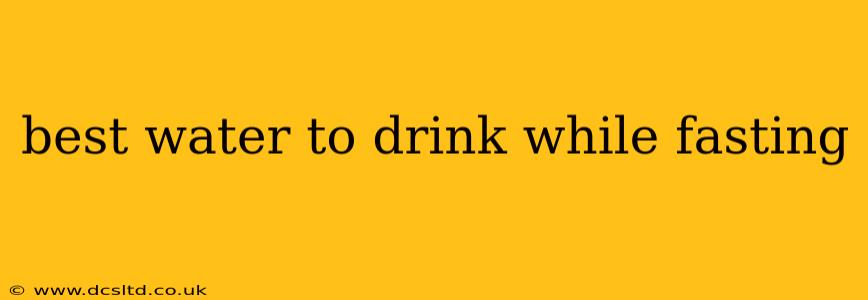Fasting, whether intermittent or prolonged, is a popular health and wellness practice with potential benefits ranging from weight management to improved cellular function. However, staying properly hydrated during a fast is crucial for maintaining energy levels, preventing headaches, and supporting overall well-being. But what's the best water to drink while fasting? The answer isn't as simple as "any water will do," as certain types might offer subtle advantages. Let's explore the options and delve deeper into the optimal hydration strategies for successful fasting.
What are the benefits of drinking water while fasting?
Before we dive into the types of water, let's address the fundamental importance of hydration during fasting. Drinking water during a fast helps:
- Maintain Energy Levels: Dehydration can lead to fatigue and dizziness, potentially hindering your fasting progress. Water keeps your body functioning efficiently.
- Suppress Appetite: Often, thirst is mistaken for hunger. Drinking water can help differentiate between the two, preventing unnecessary snacking.
- Promote Detoxification: Water aids in flushing out toxins from the body, a process that's often enhanced during fasting.
- Improve Digestion: Adequate hydration is essential for optimal digestive function, even when not actively consuming food.
- Prevent Headaches: Dehydration is a common trigger for headaches, so staying well-hydrated is crucial, especially during a fast.
What kind of water is best for fasting?
Now, let's address the different types of water and their suitability during fasting:
1. Plain, Filtered Water: The Foundation of Fasting Hydration
Plain, filtered water remains the gold standard for hydration during a fast. It's calorie-free, doesn't interfere with the fasting process, and provides the pure hydration your body needs. Filtering removes impurities like chlorine and sediment, improving taste and potentially reducing exposure to potentially harmful substances.
2. Sparkling Water (Plain): A Refreshing Alternative
Unsweetened sparkling water can be a refreshing alternative to plain water, especially if you find the latter monotonous. The carbonation won't break your fast and can even help with feelings of fullness. However, be sure it's completely unsweetened; added flavors or sweeteners would negate the fasting benefits.
3. Electrolyte Water: Replenishing Essential Minerals
Electrolyte water can be beneficial, particularly during longer fasts or if you're experiencing significant electrolyte loss through sweating or other means. Electrolytes like sodium, potassium, and magnesium are vital for muscle function and nerve transmission. However, choose electrolyte water carefully. Opt for options without added sugars or artificial sweeteners.
4. Mineral Water: Naturally Occurring Minerals
Mineral water naturally contains various minerals, which can contribute to your overall mineral intake. However, the mineral content varies significantly between brands, so check the labels. Some mineral waters are high in sodium, which might be undesirable for some individuals.
What types of water should I avoid while fasting?
While the options above generally support healthy fasting, some beverages should be avoided:
- Sugary Drinks: These negate the benefits of fasting by introducing calories and stimulating insulin production.
- Fruit Juices: Although seemingly healthy, fruit juices are often high in sugar and can interfere with your fast.
- Coffee and Tea (with milk or sugar): The addition of milk or sugar to coffee or tea introduces calories and can disrupt your fast. Black coffee or tea (in moderation) might be tolerated by some. Always consider your individual sensitivity.
Does the temperature of the water matter while fasting?
The temperature of your water is largely a matter of personal preference. Cold water can be more refreshing, while some find warm or room temperature water more soothing. Neither significantly impacts the effectiveness of the fast itself.
How much water should I drink while fasting?
The amount of water you should drink during a fast depends on various factors, including your body weight, activity level, and climate. Listen to your body's cues. If you're thirsty, drink water. Aim for consistent hydration throughout your fasting period. Don't force yourself to drink excessive amounts of water.
Can I add anything else to my water while fasting?
Adding anything other than a negligible amount of electrolytes should be avoided. The addition of lemon or other ingredients can alter the pH balance and might affect the process of autophagy, which is a cellular repair mechanism sometimes associated with fasting.
By following these guidelines and choosing the right type of water, you can optimize your hydration strategy and maximize the potential benefits of your fasting journey. Remember to consult your doctor before starting any fasting program, especially if you have underlying health conditions.
